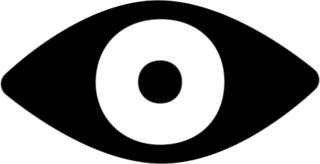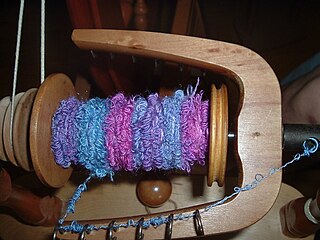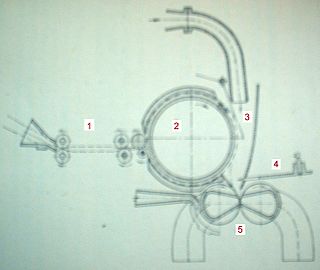
A spinning wheel is a device for spinning thread or yarn from fibres. It was fundamental to the cotton textile industry prior to the Industrial Revolution. It laid the foundations for later machinery such as the spinning jenny and spinning frame, which displaced the spinning wheel during the Industrial Revolution.

Carding is a mechanical process that disentangles, cleans and intermixes fibres to produce a continuous web or sliver suitable for subsequent processing. This is achieved by passing the fibres between differentially moving surfaces covered with "card clothing", a firm flexible material embedded with metal pins. It breaks up locks and unorganised clumps of fibre and then aligns the individual fibres to be parallel with each other. In preparing wool fibre for spinning, carding is the step that comes after teasing.

The spinning jenny is a multi-spindle spinning frame, and was one of the key developments in the industrialization of textile manufacturing during the early Industrial Revolution. It was invented in 1764 or 1765 by James Hargreaves in Stan hill, Oswaldtwistle, Lancashire in England.

The spinner dolphin is a small dolphin found in off-shore tropical waters around the world. It is famous for its acrobatic displays in which it rotates around its longitudinal axis as it leaps through the air. It is a member of the family Delphinidae of toothed whales.

Big Brother is the British version of the international reality television franchise Big Brother created by producer John de Mol in 1997. Broadcast yearly from 2000 to 2018, and due to return in 2023, the show follows the format of other national editions, in which a group of contestants, known as "housemates", live together in a specially constructed house that is isolated from the outside world. They are continuously monitored by live television cameras and personal audio microphones. Throughout the competition, housemates are "evicted" from the house by public televoting. The last remaining housemate wins the competition and a cash prize. The series takes its name from the oppressive character known by that name in George Orwell's 1949 novel Nineteen Eighty-Four.

The History Channel is a Canadian English language specialty channel that primarily broadcast programming related to history and historical fiction. It is owned by Corus Entertainment, with the History branding used under a licensing agreement with A+E Networks. The channel operates two time-shifted feeds: East and West. The West Coast feed was launched on September 1, 2006.
Cooking Channel is a Canadian English language specialty channel and a localized version of the U.S. channel of the same name owned by Corus Entertainment and Warner Bros. Discovery. Dedicated to programming related to food and cooking, its branding is licensed from Discovery Inc., which holds a minority ownership, and is also a partner on sister channel Food Network.

Textile Manufacturing or Textile Engineering is a major industry. It is largely based on the conversion of fibre into yarn, then yarn into fabric. These are then dyed or printed, fabricated into cloth which is then converted into useful goods such as clothing, household items, upholstery and various industrial products.

The Keroplatidae are a family of small flies known as fungus gnats. About 950 species are described, but the true number of species is undoubtedly much higher. They are generally forest dwellers found in the damp habitats favoured by their host fungi. They can also often be found in caves. Larvae both feed on fungi and are predatory - they can spin webs by secreting acid fluids, which they use to kill smaller invertebrates and capture spores. Some of the predatory larvae cannibalize pupa of their own species.

ESPN International is a family of sportscasting and production networks around the world. It was begun in 1989, is operated by ESPN Inc. and owned by The Walt Disney Company.
TSN2 is a Canadian English language sports specialty channel that acts as the secondary feed of sports-centred channel The Sports Network (TSN) and owned by CTV Specialty Television Inc. It was launched in its current form on August 29, 2008.

Bouclé is a looped yarn or the resulting fabric woven from this yarn.
Antenna Group, formerly known as ANT1 Group, is a media company in Greece and currently the largest Greek media company. It was established on 2 August 1989 by Minos Kyriakou. Today, his son, Theodore Kyriakou, heads up a media empire whose operations include broadcasting, radio, publishing, digital, educational services, telecommunications and a record label. At the cornerstone of the company is ANT1 TV, one of the largest and most successful private television networks in Greece.
ESPN 2 is a Latin American pay-television channel based in Buenos Aires broadcasting for Spanish-speaking Latin American countries. Its programming is mostly football-, tennis- and rugby union-related.

Archips podana, the large fruit-tree tortrix, is a moth of the family Tortricidae. The species was first described by Giovanni Antonio Scopoli in his 1763 Entomologia Carniolica. It is found in Europe, Asia from Anatolia to Japan and is an introduced species in North America.
Facing in machining can be used in two different areas: facing on a milling machine and facing on a lathe. Facing on the milling machine involves various milling operations, but primarily face milling. On the lathe, facing is commonly used in turning and boring operations. Other operations remove material in ways similar to facing, for example, planing, shaping, and grinding, but these processes are not labeled by the term "facing."

BeTV was a pay television channel, owned by Sony Pictures Entertainment in the Asia-Pacific region. Launched on 2 April 2012, it replaced AXN Beyond as a spin-off of AXN Asia and Sony Entertainment Television. Selected programs from AXN Philippines and SET were exclusively available in the Philippine feed of the channel. AXN Beyond HD, renamed BeTV HD on 2 April 2012. The renamed channel would become the first channel that ceases to be carried on Astro B.yond HD and Astro B.yond PVR on 26 August 2013 at midnight. BeTV was finally shut down on 15 October 2014 due to its merger with SET to form Sony Channel.

Friction Spinning or Dref Spinning is a textile technology that suitable for spinning coarse counts of yarns and technical core-wrapped yarns. Dref yarns are bulky, with low tensile strength making them suitable for blankets and mop yarns, they can be spun from asbestos, carbon fibres and makes filters was water systems. Yarns such as Rayon and Kevlar can be spun using this method. The technology was developed around 1975 by Dr. Ernst Fehrer.

Worth It is an American entertainment web series by BuzzFeed that premiered on September 18, 2016. Posted to Hulu and YouTube, each episode of the series compares three different food dishes from three locations that are sold at low, medium, and high price points.

Ruthie's is a restaurant in Portland, Oregon.














